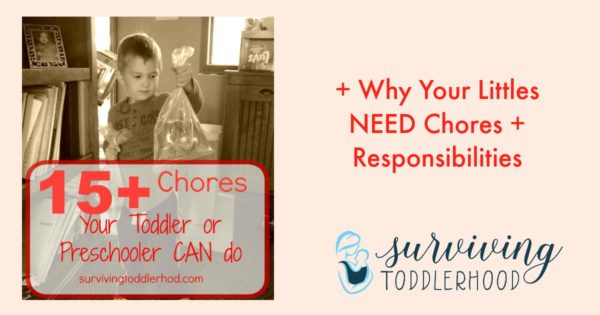Cultivating a Strong Work Ethic in Your Children
{A few months ago I ask my dad to write this post about cultivating a strong work ethic in littles and now I’m excited to share it with you!}

{This site uses affiliate links. Click here for the full disclosure.}
As a parent, one of the last things you want to hear from another parent is that your child used a four letter word. But not just to himself. Everyone heard it. Oh my! Not only does it reflect on him, but you as a parent. Goodness! You ask yourself concerning the word your child just said “Did they actually hear that from me?” “Do I actually say those things and act that way?”
Well…. Actually…, concerning one four letter word in particular, as a matter of fact I do say that word! Yep! I do! No apologies!
Huh??!!
Whhaaatttt!!!
The world has become so hung up with this one particular four letter word that many will do almost anything to avoid it. Our society has nearly built an entire class of people around avoiding this word. What’s the word?
Work.
Work! Awful isn’t it?
Work! Disgusting isn’t it!
Work! No one seems to want to do it anymore.
But, work has got to be done. Someone’s got to take out the trash. Someone’s got to clean out the barn. Someone got to make the food. Grow the food, store the food, ship the food. Build the freezers for the food. Design, engineer, assemble, maintain the trucks that transport the food. Make the stoves to cook the food.
Of course, everyone wants to eat the food. In fact, they really enjoy eating the food. Isn’t that amazing?
The nursery story “The Little Red Hen” pretty much sums it up when comes to helping with the chores these days. Everyone seems so busy with other things when the time comes to plowing, planting, weeding, and harvesting. But, mysteriously, everyone seems to have time in their schedule to eat the bread from the wheat that was planted, cultivated, harvested, and prepared by others.
Mike Rowe has hosted two different shows (Dirty Jobs and Somebody’s Gotta Do It) that bring the otherwise mundane and disgusting jobs to a higher level of appreciation by the viewers. I have really enjoyed watching these shows (mostly the reruns) when I can. But each of us have our own set of “Dirty Jobs” that we must do every day to run our own households and businesses.

Cultivating a Strong Work Ethic in Your Children Starts with Changing Your Attitude
We, as a society, need to align our attitudes and understanding of work to form a more lasting, dignified, appreciative, and godly perspective of such an honorable and dignified activity. We all benefit from the productive, efficient, talented work of others.
But more than that, as Christian parents, we need to be a part of training the next generation of workers to have a healthy regard and respect for a good work ethic. We need to instill in each of our children the mission and purpose God gave all of us to fulfill. To joyfully and creatively work with our gifts, talents, and abilities to “tend and to keep” that what we have in such a way as to multiply it and bless others with it. And in so doing, we bless Him and our communities through that process.
God designed man to work. Contrary to popular opinion, work is not a curse or part of “The Curse.” Unfortunately, many (even in Christian circles) believe that work was a part of “The Curse”. But, it was not.
Adam was working in the garden before the curse went into effect. God commanded Adam to have dominion over the earth, and over the animals. Adam was caring for the animals and the garden (work!). He placed Adam in the garden “to tend it and to keep it.” That takes work.
What did occur, as a result of the fall, was that work would now have “difficulties” from within (sweat and the breakdown of the body) and without (thorns and thistles, mosquitoes, bees, etc) that would hamper productivity. Teaching our children to carry on with our work in spite of these and other difficulties is an important aspect of cultivating a strong work ethic. We have all had times when we wanted to quit. But most of us have grown up enough to realize that many times that is not the most prudent option.
We need to teach our children about the importance and dignity of work as we are cultivating a strong work ethic.
So how can we go about the teaching of the importance and dignity of work to our children?
Before I get to some specific suggestions about the training process I want to point out that there are at least two different aspects of this subject that our worth our attention. The first is- simply teaching our children about the benefits of work (an excellent first step). The second (and the deeper and longer lasting) is teaching our children to have and maintain a good strong “work ethic”.
A good and proper work ethic will provide lifelong benefits to themselves, their future family, and their future community.
I have a lot of stories I could share about the many joys and sorrows I have experienced in work, and the joys and difficulties in working with others and my own children. I’ve learned an awfully lot from those experiences and from others I’ve worked with. I clearly remembering as a 12 year-old boy that last time I cleaned out the chicken coop. It had no windows, straw bedding, and chicken manure – and lots of it. It had been too long since it was last cleaned. The manure was thick and packed tightly in the straw.
A coop so small that I couldn’t stand straight up. I had to bend over the whole time. So, on a hot August morning, hunched over a pitch fork inside a tiny coop, reeking of chicken manure ammonia so badly that my eyes burned, I was thinking how glad I was that my younger brother was going to be taking over this job and I would never have to do it again. I would never have to handle a pile of manure again, so I thought. I was going to be graduating from that stinky job to “better” work.
Well little did I know then that every job I did from then on had hidden inside of it those hunched over, back breaking, eye straining, piles of manure moments. Every job has its good and bad aspects that go with it. Now that “manure pile” has a little different name and a little different shape. And people seem to keep dumping a little of their own manure on my pile and expect me to take care of that extra stuff also. Along with the other things I’ve already got going, that makes the work load just a bit bigger than what I’ve already got.

Cultivating a strong work ethic brings life long benefits.
So, what are those “benefits” from work that we all can enjoy? Well let’s just pause for a moment and think about all those things that result from work well done.
Basic Needs
We all need food, shelter, and clothing. We can get none of those without work. But, you may say, there are a lot of people who are not working that still get their food, shelter, and clothing. Yes! but not without someone having first worked for it. Maybe they didn’t work for it, but someone else did.
One of the first, and most important truism in life. Someone has to work in order for others to live. Someone has to plow the ground, plant the seed, water, hoe, weed, cultivate, harvest, store, preserve, prepare the food, clean-up, put away, etc. before someone can actually even eat the food. And its usually a lot of different people along the way. But none of it can happen unless someone works for it.
The same is true for shelter and clothing. Someone has to cut the trees, skid the logs, mill the logs, stack the boards, dry the boards, cut the boards and assemble the boards into a shelter. It all takes work. The house you live in now took hundreds of hours of work to build and finish. Clothing is no different. Someone has to build the factory to form the cloth, to dye the cloth, cut the cloth, sew the cloth, etc. in order for us to have a shirt to wear. Work provides for our very basic needs. But a lot more than just that.
Accomplishment
At the top of this list is that work gives us a momentary sense of accomplishment. No matter how bad the job was, I was sure glad when it was completed. But, I was taught to get the job totally done, not just half of it. All of it. And to clean things up and put all the tools away when I was through. And once “all” of those things were done, I felt like I had actually accomplished something. Because I had just accomplished something. And that felt good. A feeling of accomplishment adds to one’s self-esteem.
Order
But the benefits of work reach way deeper than just a sense of accomplishment. If the work was simply cleaning my room, then I also benefited from the “Order” that was created for me and my family to live in. No one likes to live in disorder and chaos. Given the choice between a clean bedroom and a dirty bedroom with an un-made bed, we would all probably choose to sleep in the clean bedroom with a made bed and clean sheets.
But none of that just “happens” on its own. Someone works to make that happen. We all enjoy the benefits of a clean house. A clean kitchen. A clean car. A clean bathroom, A clean work environment. A clean grocery store. A clean barn. We all like to see things in their spot and right where they belong. But none of that just happens on its own. Someone needs to work to make that happen.
Fulfillment
One of the side benefits of work is a sense of fulfillment. When we move through life with our day to day objectives, and things seem to flow right along, and you actually get done with everything you had hoped for that day and just a little bit more, we get this uplifted sense of fulfillment that only meaningful work can do. Without meaning, we drift toward mental instability.
Yep! It’s true. We can go insane with meaningless work. This has been demonstrated time and again through the centuries. When workers in a concentration camp were given orders to dig a large hole they worked together as a group to get the hole dug. When orders were then given to then fill in the same hole, without having been given any reason for having dug the hole in the first place, a sense of despair and vanity leaped into the minds of the workers. When repeated several times over and over, the workers, one by one, started going insane.
In another concentration camp, workers were given orders to construct bombs that they knew would actually bring destruction on those fighting for their liberation, workers found that they could actually get a sense of meaning from the work that would likely bring death to their own freedom fighters. But the work was meaningful and workers were able to work for months assembling the very bombs that would prevent them from getting free from the camp. Their work had meaning. Meaningful work brings a sense of fulfillment.
Self-Worth
Along with fulfillment is the benefit of self-worth. We all like to feel needed and appreciated. We all want to feel like we are contributing toward the family’s well-being. We all like to hear from others how much our work has helped the company, or the department, or the community.
I remember one time in particular when I was young that I helped contribute to the family. I can’t tell you how proud I was when I shot my first deer. It was not a big buck at all. Just a really little buck that had already been wounded by someone else. But I didn’t care how small it was. I had just helped bring meat to that table. And that felt good! I felt like I was a real contributor in our family. My sense of self-worth soared.
Blessing Others
We all like Christmas with all the love and presents. Not only does it give us satisfaction seeing the reactions of our kids when they open their presents, but we like seeing the reaction of the ones who gave the presents. What a sense of gratification they get from someone else appreciating their gift that they had worked toward.
We all appreciate the stories we’ve heard of others going out of their way to help a neighbor shovel their driveway and/or sidewalks. The friend who stops in to lend a helping hand with a project around the house. The unknown people and strangers of the Christian community who just show up with food, shelter, and clothing when your house burns down. Many of these stories will bring tears to your eyes. People loving other people and demonstrating it through meaningful work.
Yes! work has deep meaning and hard work has a lifetime of benefits. Our children (and our parents) need to be fully aware of the benefits of meaningful, productive work.
You know…work is really not such a bad word as some might think.
Wayne Kauffman {aka Rebekah’s dad} has been married for thirty-three years and is the father of six living children. He attended Seminary at Liberty University, helped to start a few churches, and ministers to assisted living residents monthly. He owns his own business, enjoys triathlons, biking, and giving his grandchildren rides on “The Mule”.
You May Also Like:




Leave a Reply